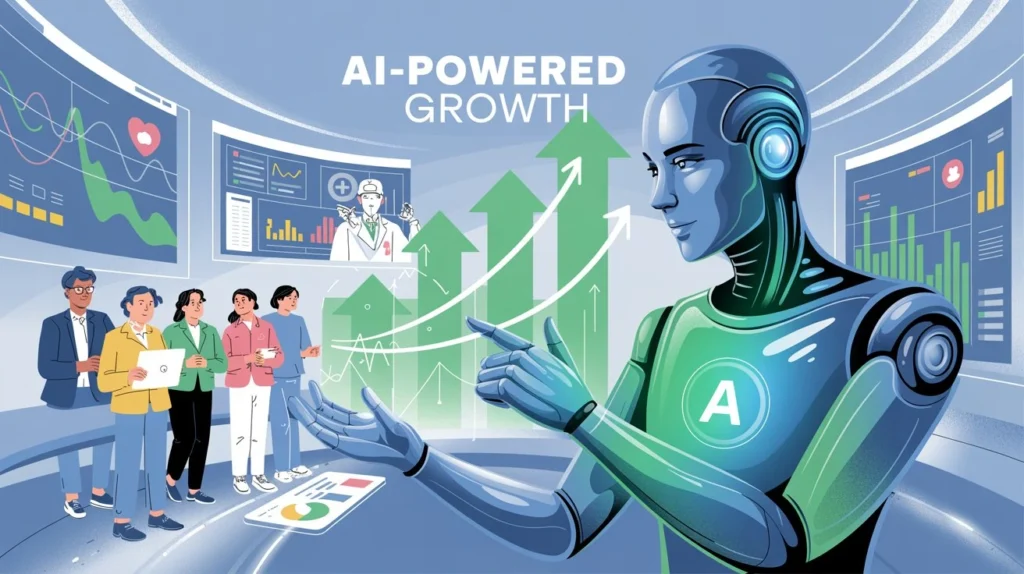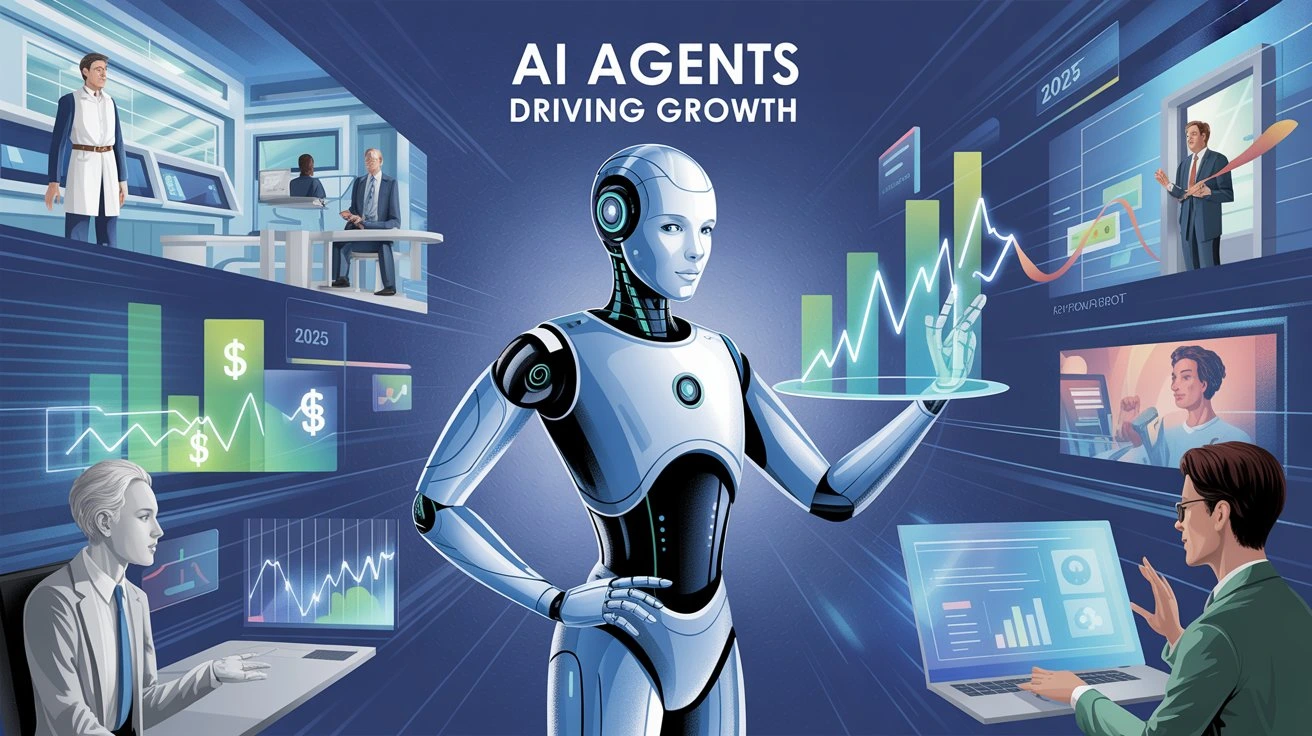Introduction
As artificial intelligence continues to evolve at a rapid pace, Autonomous AI agents are emerging as the next big frontier in tech innovation. In 2025, these intelligent, self-operating systems are not only reshaping how businesses function—they’re also attracting unprecedented interest from venture capitalists and angel investors. With the ability to make decisions, automate complex workflows, and adapt to real-time data without human supervision, Autonomous AI agents are driving a significant wave of seed-stage investments. This article explores why these agents are leading investment trends in 2025, their real-world applications, and what the future holds for this transformative technology.

What Are Autonomous AI Agents?
Autonomous AI agents are smart software entities capable of executing complex tasks based on goals, context, and learned data. Unlike basic automation, these agents act with a high degree of autonomy, often mimicking human decision-making processes.
They are being used in:
- Virtual assistants for productivity
- AI customer service bots
- Financial portfolio analyzers
- AI-powered marketing managers
These agents can perform real-world functions such as writing emails, scheduling meetings, analyzing data, or managing customer inquiries—without human intervention.
🚀 What’s Happening?
Autonomous AI agents—software that can take complex actions independently—are attracting massive early-stage funding this year. Venture capitalists are backing startups building agents that can handle a variety of tasks like scheduling, content creation, customer support, and even strategic decision-making without constant human oversight.
Why Autonomous AI Agents Are Attracting Investors
1. Massive Cross-Industry Potential
From healthcare to e-commerce, Autonomous AI agents are streamlining operations, reducing costs, and enabling smarter workflows. Their flexibility makes them ideal for scaling across diverse sectors.
2. Improved ROI and Scalability
Startups deploying Autonomous AI agents benefit from cost efficiency, operational speed, and the ability to scale with minimal resources. This makes them especially attractive for early-stage investors seeking strong returns.
3. AI Ecosystem Readiness
With advancements in large language models (LLMs), machine learning infrastructure, and cloud services, building and deploying Autonomous AI agents has become faster and more accessible than ever before.

2025 Seed Investment Surge
The rise of Autonomous AI agents has led to a dramatic increase in early-stage funding:
- Nearly 35% of AI seed investments in Q1 2025 targeted autonomous agent startups.
- Funding rounds range between $1M–$20M, driven by high scalability and low operating costs.
- Top-tier VC firms like Sequoia, Andreessen Horowitz, and SoftBank Vision Fund are leading the way.
Top Real-World Use Cases of Autonomous AI Agents
| Industry | Key Applications of Autonomous AI Agents |
|---|---|
| Healthcare | Intelligent patient triage, symptom assessment, automated appointment scheduling |
| Finance | Real-time portfolio management, fraud detection, market trend analysis |
| Retail & E-commerce | AI-powered personal shopping assistants, smart product recommendations |
| Customer Support | 24/7 AI chatbots, automated ticket handling, customer feedback analysis |
| Marketing | Content creation, automated ad campaign management, social media engagement bots |
⚠️ Key Challenges Facing Autonomous AI Agents
While Autonomous AI agents offer incredible opportunities for innovation and efficiency, they also come with a set of critical challenges that developers, startups, and investors must address. Ignoring these concerns could hinder adoption, damage user trust, and invite regulatory scrutiny.
🧠 1. Ethical Concerns and Algorithmic Bias
One of the biggest challenges with Autonomous AI agents is ensuring ethical behavior and fairness in decision-making. These agents often rely on large datasets that may contain historical biases. If left unchecked, this can lead to discriminatory outcomes in areas such as hiring, healthcare prioritization, or financial services.
Solution: Developers must use bias-detection tools, diverse datasets, and fairness audits to ensure equitable outcomes across different user groups.
🔐 2. Data Privacy and Security Risks
Because Autonomous AI agents often access and process large volumes of sensitive data—such as medical records, financial details, or personal identifiers—there is a high risk of data breaches, unauthorized access, or misuse.
Solution: Implement robust encryption, role-based access controls, and compliance with data protection laws (like GDPR or CCPA) to safeguard user information.
🔎 3. Lack of Transparency and Explainability
Many AI agents operate as “black boxes,” making decisions without clear, human-readable explanations. This lack of transparency makes it difficult to understand why a particular action was taken, which can erode trust—especially in regulated industries like finance or healthcare.
Solution: Adopt explainable AI (XAI) techniques that provide insight into how decisions are made, enabling users and regulators to audit and validate agent behavior.
📉 4. Over-Reliance on Autonomy
While the goal is independence, Autonomous AI agents must still be monitored. Over-relying on AI without human oversight can lead to errors, misjudgments, or unintended outcomes, especially in high-stakes environments.
Solution: Maintain a “human-in-the-loop” system for critical tasks, ensuring human review and intervention when necessary.
🛠️ 5. Regulatory and Legal Uncertainty
As Autonomous AI agents become more widespread, legal frameworks are still catching up. Questions about liability, compliance, and ethical responsibility remain unresolved in many jurisdictions.
Solution: Stay informed of emerging AI regulations and ensure your systems are adaptable to future legal requirements.
✅ The Path Forward
Startups that tackle these challenges with transparency, responsibility, and a user-first mindset will not only build better products but also stand out in the eyes of investors and customers. Addressing ethics, security, and trust is no longer optional—it’s essential for the long-term success of any company working with Autonomous AI agents.
What is the future of Autonomous AI agents in business and technology?
The future of Autonomous AI agents is incredibly promising, as they move beyond experimental use into real-world business applications. These intelligent systems are rapidly reshaping how organizations operate by automating complex tasks, making data-driven decisions, and integrating seamlessly into everyday workflows. With increasing venture capital investment and continuous technological innovation, we can expect:
- Faster development and deployment of AI-driven solutions
- Deeper integration into core business operations across industries
- A strong shift toward AI-first company models where automation drives decision-making
- Higher levels of efficiency, scalability, and adaptability
As companies continue to adopt Autonomous AI agents, they will become central to digital transformation strategies, setting a new standard for productivity and intelligent automation.
Sure! Here’s a well-structured, SEO-friendly table titled “Why Investors Are Betting Big on Autonomous AI Agents”for your article:
💰 Why Investors Are Betting Big on Autonomous AI Agents
| Key Factor | Explanation |
|---|---|
| Broad Applicability | Autonomous AI agents can be implemented across diverse industries—automating marketing, sales, research, and operations—making them highly scalable. |
| Efficiency Gains | Startups using Autonomous AI agents are attracting attention for significantly reducing manual labor, speeding up decisions, and cutting operational costs. |
| Competitive Edge | With rapid advancements in AI technologies like natural language processing and computer vision, Autonomous AI agents represent the next big leap in scalable AI deployment. |
Funding Landscape for Autonomous AI Agents
In 2025, the funding landscape for Autonomous AI agents is witnessing remarkable growth, especially at the seed investment stage. Venture capital firms and angel investors are increasingly recognizing the transformative potential of agent-first startups and are dedicating more capital specifically to this emerging sector.
Surge in Seed-Stage Deals
Seed deals targeting companies developing Autonomous AI agents have spiked significantly over the past year. This surge reflects growing investor confidence in the technology’s scalability and ability to disrupt traditional business models. Startups that focus on creating intelligent, autonomous systems capable of handling complex tasks without human intervention are now considered prime candidates for early-stage funding.
Evolving Valuations
Although valuations in this sector are still relatively modest compared to more mature AI segments, they are trending upwards rapidly. This upward momentum is driven by:
- Demonstrated strong product-market fit from early adopters
- Clear strategic advantages such as cost savings, operational efficiency, and automation
- The broad applicability of autonomous agents across multiple industries, enhancing market potential
Many investors are optimistic about the long-term return on investment, believing that the current valuations undervalue the future impact these agents will have on business and society.
Strategic Capital Allocation
Leading venture capital firms are now setting up dedicated funds or investment arms to focus exclusively on Autonomous AI agents and related technologies. This specialized capital allocation helps startups gain access to not just funding but also mentorship, industry connections, and go-to-market support.
Looking Ahead
As technology continues to advance and more startups demonstrate real-world success, the funding ecosystem around Autonomous AI agents is expected to become even more vibrant. Investors who enter the space early stand to benefit from the accelerated innovation and growing adoption of these intelligent agents.
Conclusion
Autonomous AI agents are rapidly transforming the technology landscape, driving innovation across multiple industries with their ability to automate complex tasks and deliver scalable solutions. The surge in seed-stage investments highlights the growing confidence investors have in this technology’s potential to revolutionize business operations. Despite challenges like ethical concerns and data security, startups addressing these issues stand to gain significant market advantage.
As more capital flows into the sector, Autonomous AI agents will become central to the future of intelligent automation and digital transformation. For investors and entrepreneurs alike, this emerging field presents exciting opportunities to shape the next generation of AI-powered solutions and unlock substantial returns. Staying ahead in this space means embracing the power and promise of autonomous intelligence—an inevitable force in the evolution of AI-driven innovation.





